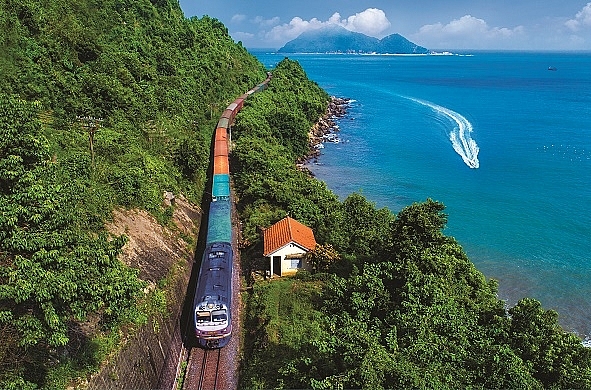Transport giants clamour for government support
 |
| Transport giants clamour for government support |
In late April, Vietnam Railways (VNR) increased the number of trains on the North-South network after nearly a month of running only a couple of carriages as requested by the government to prevent the spread of the coronavirus.
A representative of VNR said that it has not enjoyed any incentives. “We are waiting for the government’s supporting policies especially involving taxes; exemption of infrastructure use fee which makes up 8 per cent of VNR’s total revenue annually; restructuring of the debt repayment period; and continuation of lending working capital to ensure their operation,” he told VIR.
Fortunately, what VNR expects are included in the government’s latest draft resolution on the supporting policies for businesses which is being completed for issuance. The VNR representative however admitted, “Even when we get the financial supporting tools, the railway sector will take about three to four years to recover.” For this year, the corporation estimates the parent company’s revenue might fall by VND700 billion ($30.43 million) to VND1 trillion ($43.47 million) compared to the yearly targets, and a loss of VND694 billion ($30.17 million) to VND935 billion ($40.65 million), depending on when the pandemic ends.
The concern is convincing as its performance has suffered in the last decade due to stiffening competition, limited state funding, and downgraded infrastructure despite strong efforts. At present, VNR’s passenger and cargo transport market shares are just 0.2 and 1.2 per cent, respectively.
Similarly, shipping conglomerate Vietnam Maritime Corporation (VIMC) is hoping for financial tools to come into effect soon. VIMC desires to get extension of the lending term for credit contracts without a fine on late payments, to restructure the debt repayment period, and to continue to lend working capital to ensure operation. VIMC is also owner of heavy bank loans used to purchase the fleet of the sunken state-run Vietnam Shipbuilding Industry Group. Meanwhile, logistics and seaports are affected due to a break in the global supply chain.
“VIMC’s recovery, especially in shipping, and logistics will much rely on the time of controlling the pandemic among countries, and all economic activities resume operation globally,” Nguyen Canh Tinh, CEO of VIMC.
No better than the others, national flag carrier Vietnam Airlines is in need of supporting policies. Most urgent for the group may be extension of the lending term for credit contracts without a fine on late payment, restructuring of the debt repayment period, and continuation to lend working capital to ensure their operation. In addition to this is reduction of fees for taking off, landing, and flight control for VNA, and other taxes.
It was reported that in early 2020 Vietnam Airlines had reserves of VND3.5 trillion ($152.17 million), but has all but vaporised due to the pandemic. As aviation is one of the transport segments being hardest hit by the pandemic, Vietnam Airlines is one of the largest victims when in the first quarter of 2020, its consolidated revenue fell by VND6.7 trillion ($291.3 million) from the same period last year to VNDVND19.2 trillion ($834.78 million), thus hitting a loss of VND2.38 trillion ($103.47 million).
Last week Vietnam Airlines Group, which includes Vietnam Airlines, VASCO, and Jetstar Pacific announced plans to resume all their domestic air routes from June. Experts, however, said that Vietnam Airlines will take months to return to its golden age of double-digit growth rate and record profits. The airline projects a loss of VND19.65 trillion ($854.34 million) for the whole year.
Other transport titans like Airports Corporation of Vietnam and Vietnam Expressway Corporation are forecast to suffer losses this year at VND140 billion ($6.08 million), and VND9.33 trillion ($405.65 million) respectively, despite having access to financial support tools.
“Looking forward, the scenario will continue to be hard as flights to and from international routes are still being suspended and lockdown in many countries amid serious global COVID-19 developments,” said a senior economist.n
What the stars mean:
★ Poor ★ ★ Promising ★★★ Good ★★★★ Very good ★★★★★ Exceptional
Related Contents
Latest News
More News
- Masan Consumer names new deputy CEO to drive foods and beverages growth (February 23, 2026 | 20:52)
- Myriad risks ahead, but ones Vietnam can confront (February 20, 2026 | 15:02)
- Vietnam making the leap into AI and semiconductors (February 20, 2026 | 09:37)
- Funding must be activated for semiconductor success (February 20, 2026 | 09:20)
- Resilience as new benchmark for smarter infrastructure (February 19, 2026 | 20:35)
- A golden time to shine within ASEAN (February 19, 2026 | 20:22)
- Vietnam’s pivotal year for advancing sustainability (February 19, 2026 | 08:44)
- Strengthening the core role of industry and trade (February 19, 2026 | 08:35)
- Future orientations for healthcare improvements (February 19, 2026 | 08:29)
- Infrastructure orientations suitable for a new chapter (February 19, 2026 | 08:15)

 Tag:
Tag:



















 Mobile Version
Mobile Version